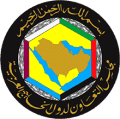

The Cooperation Council for the Arab States of the Gulf, originally (and still colloquially) known as the Gulf Cooperation Council, is a regional intergovernmental political and economic union consisting of all Arab states of the Persian Gulf, except for Iraq. Its member states are Bahrain, Kuwait, Oman, Qatar, Saudi Arabia, and the United Arab Emirates.
The Supreme Council of the Gulf Cooperation Council (GCC) is the highest authority of the organization. It is composed of the heads of the Member-States. Its presidency rotates periodically among the Member States in alphabetical order. It meets in an ordinary session each year. Extraordinary sessions may be convened at the request of any one Member-State seconded by another Member State. At its summit held in Abu Dhabi in 1998,the Supreme Council decided to hold consultative meetings in between the last and the coming summit. To be valid a meeting must be attended by two-thirds of the Member-States. Each Member State has one vote. Resolutions in substantive matters are carried by unanimous approval of participating member states in the voting. However, decisions on procedural matters are taken by the vote of the majority of the Supreme Council.